A story of the world's "largest Christmas store" and the world's largest Christmas factory.
DETROIT/HANGZHOU, Dec. 14 (Xinhua) -- Wayne Bronner, president and CEO of Bronner's Christmas Wonderland, a retail store in Frankenmuth in the U.S. state of Michigan, has for decades proudly promoted his business as "the world's largest Christmas store."
About 11,000 km away, across the Pacific Ocean, Yiwu market -- the primary wholesale market complex in Yiwu in east China's Zhejiang province -- has established itself as the world's largest small commodities market and largest Christmas factory.
Of all the items at Bronner's, 30 to 40 percent come from China, and the store intends to keep buying Chinese products -- tariffs or no tariffs. Many of the 600 companies in Yiwu that produce nearly two-thirds of all the world's Christmas decorations and accessories, on the other hand, have moved on from solely focusing on the American or European market.
So for both Bronner's and Yiwu, the latest news that China and the United States have agreed on the wording of a phase-one economic and trade agreement, which includes tariff relief, came as an early Christmas gift.
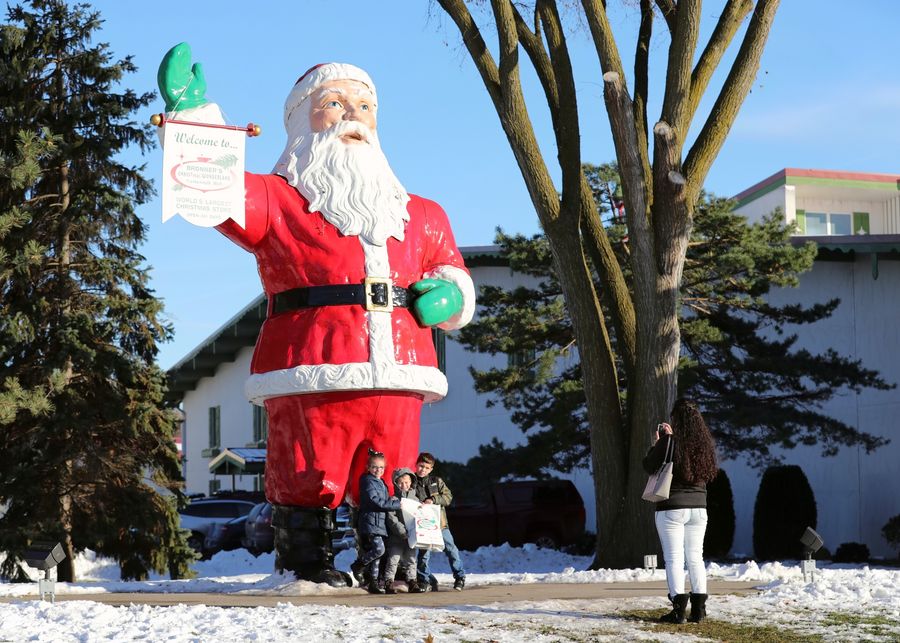
A mother takes photos of her children with a 5-meter-high Santa Claus statue outside the Bronner's Christmas Wonderland in Frankenmuth of Michigan state, the United States, Nov. 16, 2019. (Xinhua/Wang Ping)
CHRISTMAS ALL YEAR ROUND
Established in 1945 and open 361 days of the year, Bronner's brings the warmth of the Christmas season to shoppers all year round. Its electricity bill averages 1,250 dollars per day, with approximately 100,000 outdoor Christmas lights illuminating its grounds every evening.
The overall size of the Bronner's building is approximately 7.35 acres (2.97 hectares), or 5.5 football fields of space, with a parking lot that can accommodate 1,500 vehicles at one time. Its own thoroughfare, Christmas Lane, is half a mile (0.8 km) long.
Each year, about 2 million shoppers buy more than 2 million ornaments and over 125,000 light sets at the store. This year, over 50,000 trims and gifts are on offer, said the store's president Bronner in a recent interview with Xinhua.
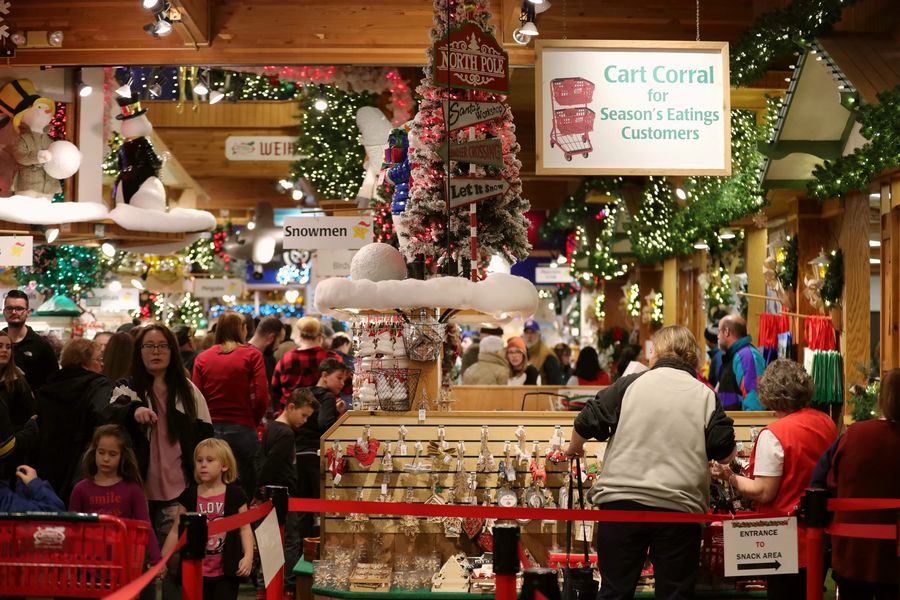
Customers shop at Bronner's Christmas Wonderland in Frankenmuth of Michigan state, the United States, Nov. 16, 2019. (Xinhua/Wang Ping)
"We have products that come from countries around the world and we buy from Chinese factories very extensively. The prices of ornaments and Christmas lights from China are much lower than those from Europe and we sell a lot of them," Bronner said.
Across the store, many of the artificial Christmas trees, ornaments and decorations, as well as popular Christmas gifts like children's clothes and dolls, have a "Made in China" label. Saith, a 20-year-old college student at the store who did not give her surname, said, "Chinese products are popular, and I don't think a lot of people even realize that these were made in China."
As a matter of fact, up to 80 percent of all the world's Christmas products are made in China, with about 80 percent of those manufactured in Yiwu. Much like at Bronner's, every day also feels like Christmas at the festival arts section of Yiwu market.
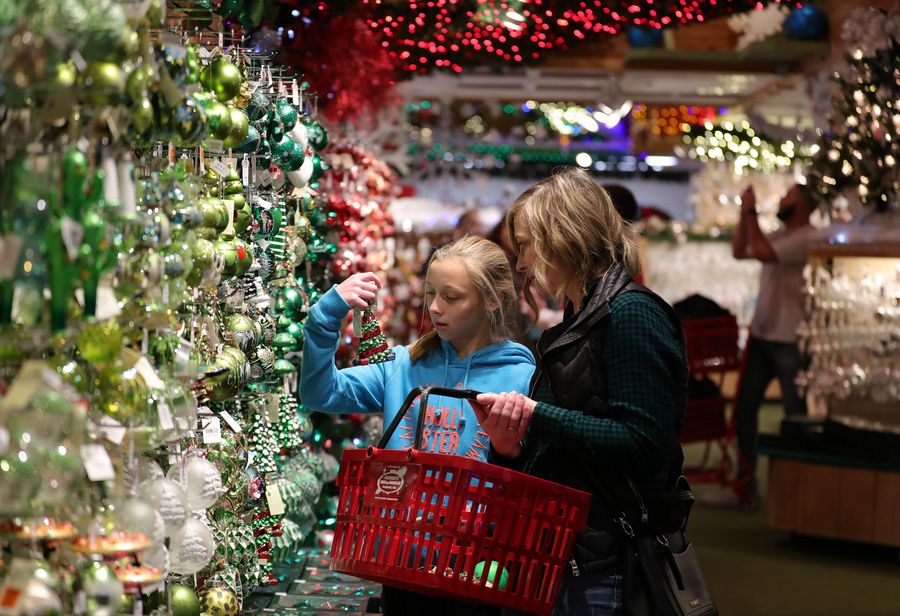
Customers shop at Bronner's Christmas Wonderland in Frankenmuth of Michigan state, the United States, Nov. 16, 2019. (Xinhua/Wang Ping)
Bronner noted that, apart from importing traditional ornaments and decorations as in previous years, this year his store has also purchased many high-tech Christmas lights from China.
It seems no coincidence that Linhai Yinhe Electric Lamp, a decorative lights company, reported a sales increase of 20 percent to the U.S. market this year. Qu Xiaoping, the company's general manager, said, "We keep innovating and developing new products. Half of our exports this year are these new products."
In order to secure Chinese products for holiday sales back home, more than 13,000 Christmas traders from over 100 countries and regions reside in Yiwu, with over 500,000 international buyers visiting Yiwu at least once a year.
Bronner said his staff go to China every year in October to check out new designs and place orders. His store also imports many of its products from Shenzhen, another center of Christmas product manufacturing in southern China.
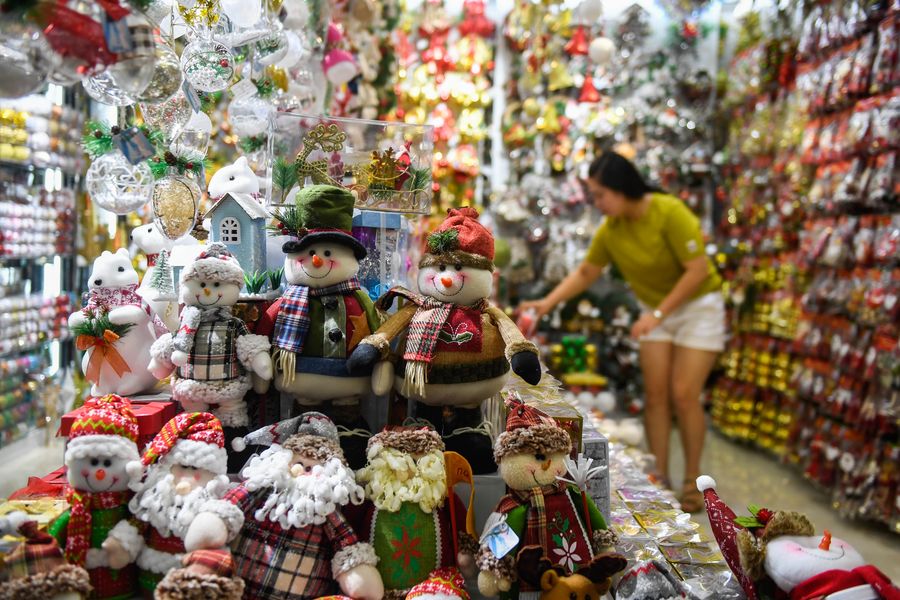
Christmas commodities are seen at a booth of the Yiwu International Trade City in Yiwu, east China's Zhejiang Province, June 26, 2019. (Xinhua/Huang Zongzhi)
TRADE TENSIONS A WAKE-UP CALL
This year there has not been any unbearable price hike for customers of Bronner's. But Bronner said, "Like many American businesses, we will absorb the high cost temporarily, but eventually the increased cost will be passed on to the consumers."
"Higher tariffs will not be good for American consumers," Bronner said.
Pam Gilchrist, a 60-year-old retiree shopping at the store, told Xinhua that she buys a lot of made-in-China products for the holidays every year.
"It's one of the ways that we are able to keep the prices lower in the United States. I am not for tariffs at all. I think it's harder on everybody," Gilchrist said.
To the relief of businesses and consumers in the United States, the U.S. government will fulfill its commitment to phase out additional tariffs on Chinese products, switching from hiking to cutting additional tariffs, according to the agreement reached on Friday.
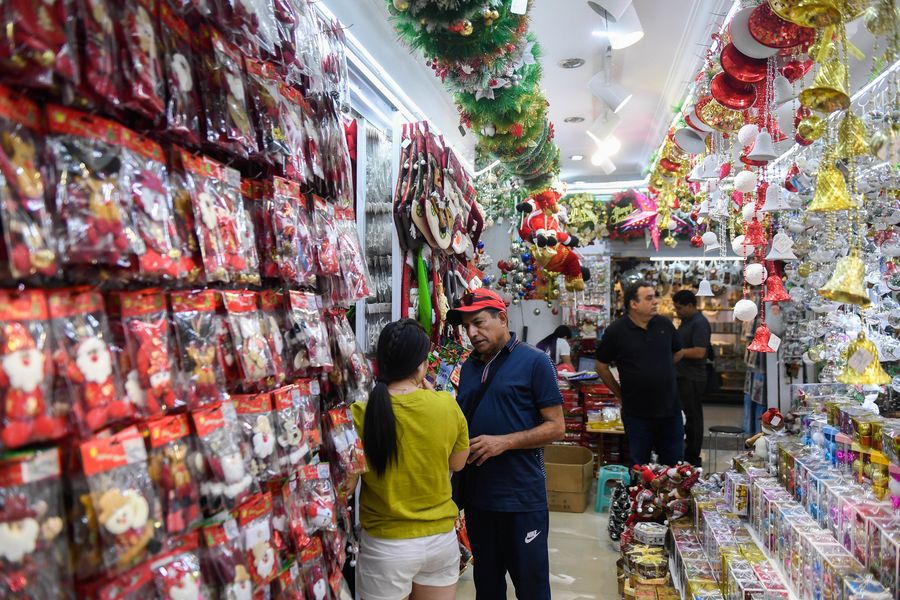
A foreign businessman selects Christmas commodities at the Yiwu International Trade City in Yiwu, east China's Zhejiang Province, June 26, 2019. (Xinhua/Huang Zongzhi)
Industry insiders pointed out that tariffs imposed by the U.S. government could make Christmas much more expensive for consumers in the near future, but have had a rather limited impact on business in Yiwu, where manufacturers experiencing decreases in U.S. orders have shifted their focus to new markets.
Earlier United Nations statistics showed that about half of made-in-China Christmas products would flow to the United States. However, the Yiwu Christmas Products Industry Association recently confirmed a decline in the share of American markets, along with a rapid expansion in new overseas markets such as Central and South America, Africa and Southeast Asia.
"We aim to sell products to all the countries and regions that celebrate Christmas," said Cai Qinliang, secretary-general of the association.
In the first nine months of 2019, the total export of Christmas products amounted to 2.23 billion yuan (320 million U.S. dollars), an increase of over 22 percent from the same period last year, according to data from the Yiwu customs.
For years to come, Yiwu market is likely to remain one of the world's biggest suppliers of Christmas merchandise. Meanwhile, the city of Yiwu itself is such a vital part of China's export engine that, since 2014, it has become one end of the country's 13,000-km rail link to Madrid.
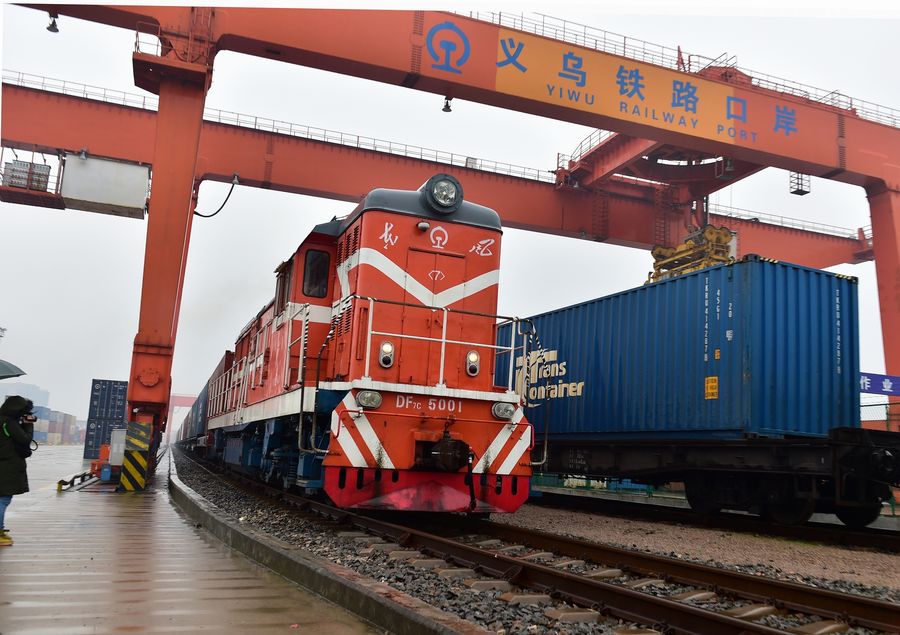
A freight train from Yiwu to Madrid departs from Yiwu Railway Port in east China's Zhejiang Province, Jan. 4, 2019. (Photo by Lyu Bin/Xinhua)
But Lan Jianping, head of local think tank the Zhejiang Institute of Industry and Information Technology, warned that all Chinese companies would have to address the challenges put forth by the complexity of the world economy in the long run.
Lan called on companies to keep improving innovation and diversifying into new markets in order to withstand global economic uncertainties.
"In a way, the trade tensions between China and the United States are a wake-up call -- a call to hold the core competitiveness in our own hands," he said.
(Video reporters: Xia Lin, Miao Xiaojuan, Zhang Yichi, Hu Yousong, Xu Jing, Miao Zhuang, Qu Lingyan, Xu Xunda; Video editor: Li Ziwei)■



